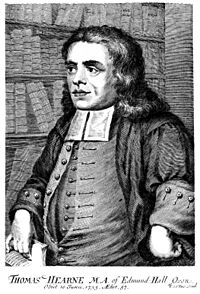Thomas Hearne (antiquarian) facts for kids
Quick facts for kids
Thomas Hearne
|
|
|---|---|

Portrait of Hearne, taken from “The Life Of Anthony à Wood” by Anthony Wood (1772)
|
|
| Born | June 1678 White Waltham, Berkshire, England
|
| Died | 10 June 1735 (aged 56–57) |
| Nationality | British |
| Alma mater | St Edmund Hall, Oxford |
| Occupation | Editor, antiquary |
Thomas Hearne (born July 1678, died June 10, 1735) was an English historian and editor. He is famous for finding and publishing many old English history books and writings. These important texts were often from the Middle Ages. Hearne spent his life studying and sharing these historical documents.
Contents
Thomas Hearne's Early Life and Education
Thomas Hearne was born in July 1678 in a place called Littlefield Green. This was in the area of White Waltham, Berkshire, England. His father, George Hearn, worked as a clerk for the local church.
Thomas learned a lot from his father when he was young. He showed a great love for learning and studying. A rich neighbor, Francis Cherry, noticed how smart Thomas was. Mr. Cherry was a Nonjuror, meaning he refused to swear loyalty to the new king.
Mr. Cherry helped Thomas go to a school in Bray. There, Thomas learned Latin, an important language for scholars. Soon after, Mr. Cherry invited Thomas to live in his own home. Thomas continued his studies in Bray until 1696.
University Life at Oxford
In 1696, Thomas Hearne started studying at St Edmund Hall, Oxford University. There, he caught the eye of Dr. John Mill. Dr. Mill was the head of St Edmund Hall. He asked Thomas to help him compare old handwritten books, called manuscripts.
Thomas earned his first degree (B.A.) in 1699. After that, he became an assistant at the Bodleian Library. This is one of the oldest and most famous libraries in the world. He helped create a list of all the books in the library. In 1712, he was promoted to second keeper of the library.
In 1715, Hearne was chosen for two important university jobs. He became the Architypographus, which was a printing official. He also became an Esquire Bedell in civil law, a ceremonial role. However, there was a rule against holding both jobs at once. So, he gave up the Esquire Bedell position that same year.
Challenges and Dedication to History
Thomas Hearne was a Nonjuror like his helper, Mr. Cherry. This meant he would not swear loyalty to the new king, King George I. Because of this, he lost his library job in 1716. He was even "locked out of the library."
Even though he lost his job, Hearne stayed in Oxford. He kept busy by editing and publishing old English history books. He turned down other important jobs, like being the main librarian of the Bodleian. He also refused the Camden professorship of ancient history, which was a teaching job. He would not take these jobs because he still refused to swear loyalty to the king.
Thomas Hearne died on June 10, 1735. People who read his books admired his deep knowledge. He was very dedicated to his studies.
Thomas Hearne's Important Works
Thomas Hearne's most important work was editing many old English history books. These books are called chronicles. For a long time, his versions were the only ones available. Many people praised his work for being well-researched and accurate.
Here are some of the important works he edited:
- De vita et gestis Henrici II. et Ricardi I. by Benedict of Peterborough (Benedictus Abbas) (1735)
- Scotichronicon by John of Fordun (1722)
- Historia vitae et regni Ricardi II by the monk of Evesham (1729)
- Robert Mannyng's translation of Piers Langtoft's Chronicle (1725)
- Chronicle by Robert of Gloucester (1724)
- Vita et gesta Henrici V, which he thought was by Thomas Elmham (1727)
- Vita Henrici V by Tito Livio Frulovisi (1716)
- Chronicon by Walter of Hemingburgh (1731)
- Historia rerum Anglicarum by William of Newburgh (1719)
He also edited other important historical texts:
- Itinerary (1710–1712) and Collectanea (1715) by John Leland
- Annales rerum Anglicarum et Hibernicarum regnante Elizabetha by William Camden (1717)
- Life of Alfred by Sir John Spelman (1709)
- Life of Sir Thomas More by William Roper (1716)
Hearne also published editions of classical texts:
- Works by Livy (1708)
- Epistolae et panegyricus by Pliny (1703)
- Acts of the Apostles (1715)
Among his other collections were:
- Ductor historicus, a Short System of Universal History (published several times, starting in 1698)
- A Collection of Curious Discourses by Eminent Antiquaries (1720)
- Reliquiae Bodleianae (1703)
Hearne's Legacy
Thomas Hearne left his handwritten notes and papers to William Bedford. These were later sold to Dr. Richard Rawlinson. Dr. Rawlinson then gave them to the Bodleian Library. Parts of Hearne's detailed diary were published in the 1800s. These diaries, called Remarks and Collections, give us a look into his life.
Not everyone liked Hearne's work. The famous poet Alexander Pope made fun of Hearne's writings. Pope called them boring and "monkish" in his poem An Epistle to Burlington. He even made fun of Hearne in another poem, The Dunciad, calling him a pedant (someone who shows off their knowledge too much). Hearne, in turn, wrote in his diary that Pope lacked real scholarship.
 | James Van Der Zee |
 | Alma Thomas |
 | Ellis Wilson |
 | Margaret Taylor-Burroughs |

